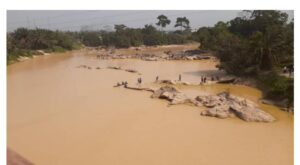Nana Romeo Declares Illegal Mining ‘Unstoppable’ in Ghana After Eastern Region Visit
 Ghanaian media personality Nana Romeo has sparked debate with his recent comments on illegal mining, popularly known as galamsey, stating that the issue cannot be stopped. His remarks come after witnessing firsthand the scale of mining activities in the Eastern Region.
Ghanaian media personality Nana Romeo has sparked debate with his recent comments on illegal mining, popularly known as galamsey, stating that the issue cannot be stopped. His remarks come after witnessing firsthand the scale of mining activities in the Eastern Region.
Speaking on Accra FM, Nana Romeo recounted his experience during a trip to Abomosu in the Eastern Region, where he observed young people actively engaging in illegal gold mining in broad daylight.
 If someone tells you that we can stop galamsey in Ghana, it’s not true. Recently, I traveled to Abomosu in the Eastern Region of Ghana, and what I saw was very disheartening. In the midday heat, I saw young people heading into the forest, equipped and ready to dig for gold. Along the roadside, I saw them actively engaged in gold mining in broad daylight, he said.
If someone tells you that we can stop galamsey in Ghana, it’s not true. Recently, I traveled to Abomosu in the Eastern Region of Ghana, and what I saw was very disheartening. In the midday heat, I saw young people heading into the forest, equipped and ready to dig for gold. Along the roadside, I saw them actively engaged in gold mining in broad daylight, he said.
 The broadcaster expressed concern over the ease with which illegal miners operate seemingly without fear of law enforcement or government intervention.
The broadcaster expressed concern over the ease with which illegal miners operate seemingly without fear of law enforcement or government intervention.
Nana Romeo further narrated an encounter with a police officer at a checkpoint, where he reported the illegal mining activities he had witnessed. However, he was stunned by the officer’s response, which suggested that galamsey had become so entrenched that there was little anyone could do to stop it.
I came across a police checkpoint and approached an officer to inform him about the situation. The officer responded that this is the norm in the area and that there’s nothing anyone can do about what’s happening, he revealed.
According to him, this response solidified his belief that ending galamsey in Ghana is an impossible task.
Illegal mining remains one of Ghana’s most pressing environmental and socio-economic challenges. Despite government crackdowns, task forces and policies aimed at eradicating the practice, galamsey operations persist across various regions, often with reports of local authorities turning a blind eye.
The practice has led to severe environmental degradation, including deforestation, water pollution and the destruction of farmlands. Additionally, the influence of powerful individuals and corruption within security forces have further complicated efforts to combat illegal mining.
Nana Romeo’s remarks highlight a troubling reality—that despite governmental efforts, galamsey continues to thrive, with some local communities and law enforcement officers appearing resigned to its existence.
His comments are likely to reignite conversations about whether new approaches, stricter enforcement, or alternative economic opportunities for youth are needed to truly address the illegal mining menace.
As the debate continues, one question remains: Can Ghana ever win the fight against galamsey, or has the battle already been lost?


